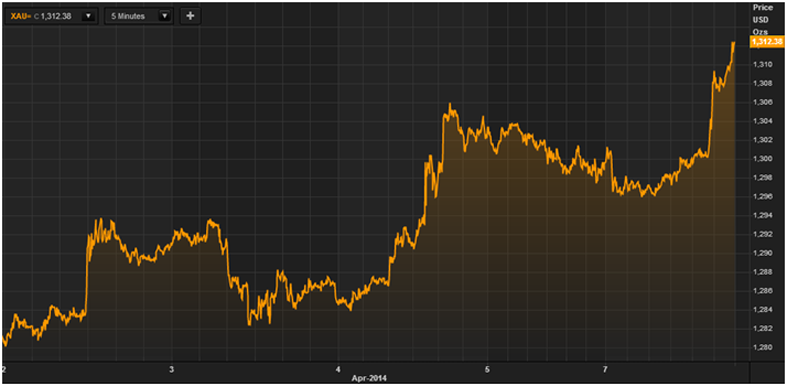Today’s AM fix was USD 1,314.75, EUR 955.14 and GBP 786.90 per ounce.
Yesterday’s AM fix was USD 1,299.00, EUR 946.93 and GBP 783.76 per ounce.
Gold fell $7.00 or 0.54% yesterday to $1,296.50/oz. Silver slipped $0.06 or 0.3% to $19.88/oz.

Gold in U.S. Dollars, 5 Days - (Thomson Reuters)
Gold bullion rose by 1.3% today to a session high of $1,313.50, on safe haven demand due to renewed geopolitical tensions in Ukraine. Technical buying was also likely after gold moved above the $1,300 an ounce mark. This may have triggered stop loss buying.
Silver, platinum and palladium were also all up about 1%.
In Ukraine, pro Moscow protesters seized arms in one city and declared a separatist republic in another, in moves Kiev described as part of a Russian orchestrated plan to justify an invasion to dismember the country.
Russia has alleged that there are 150 U.S. mercenaries working with the Ukraine military and urged Ukraine to halt any interior military preparations which could lead to a civil war.

Gold in U.S. Dollars, 1 Year - (Thomson Reuters)
Gold looks set to benefit from the continuing economic and geopolitical uncertainties.
Also supportive may be Chinese demand which returned after their markets reopened after the Tomb Sweeping holiday yesterday.
UK And Nigeria Use Accounting Tricks To Boost GDP
A radical overhaul of the UK national accounts is set to double the official measure of household savings rates
according to the Financial Times. The moves will present Britons as a nation of unexpected prudence and undercut their widely held reputation for profligacy and indebtedness.
For the first time in 15 years, the Office for National Statistics (ONS) is preparing to rip up the way it measures Britain’s economy. The new “techniques” will show a huge increase in the size of the economy, a higher level of public debt and a much increased savings ratio.
The UK’s Office for National Statistics will alter the way it measures the economy by adopting new accounting standards to gross domestic product and related measures in September. There is also a good chance that the government statisticians will significantly revise up growth recorded in the economy in 2012 and last year.
One of the biggest changes will see future pension rights measured as if they were present income. Given that the UK has a large funded private sector defined benefit pension system, this will significantly increase the official savings ratio.
In addition, research and development spending will count towards GDP rather than being seen as a cost of production. The ONS says the accounting change will add between 2.5% and 5% to the official measure of GDP, increasing the total by up to £75 billion.
Bizarrely, the accounting gimmick at the Office for National Statistics (ONS) will turn the UK into a nation of savers instantly.
It is hoped that the moves will have a PR benefit, overturning Britain’s reputation as a spendthrift nation and significantly improve the poor productivity performance of the past few years by including future pension rights as current income.
The reforms, the first for 15 years, will 'boost the size' of the economy, increase the amount of public debt and raise the savings ratio. The report said, as a result the body could revise up growth in 2012 and 2013.
Separately, Nigeria has "rebased" its gross domestic product (GDP) data, which has pushed it above South Africa as the Africa's largest economy.
GDP for 2013 totalled 80.3 trillion naira (£307.6 billion: $509.9 billion), the Nigerian statistics office said. That compares with South Africa's GDP of $370.3 billion at the end of 2013.
However, some economists point out that Nigeria's economic output is underperforming because at 170 million people, its population is three times larger than South Africa's. On a per capita basis, South Africa's GDP numbers are three times larger than Nigeria's. Nigerian financial analyst Bismarck Rewane called the revisions "a vanity".
Accounting tricks and manipulation of economic data is taking place globally and will contribute to people being misled regarding the actual true state of national economies and the global economy.
The false sense of security seen before the global financial crisis has returned ...
Recommended Content
Editors’ Picks
AUD/USD retargets the 0.6600 barrier and above

AUD/USD extended its positive streak for the sixth session in a row at the beginning of the week, managing to retest the transitory 100-day SMA near 0.6580 on the back of the solid performance of the commodity complex.
EUR/USD keeps the bullish bias above 1.0700

EUR/USD rapidly set aside Friday’s decline and regained strong upside traction in response to the marked retracement in the Greenback following the still-unconfirmed FX intervention by the Japanese MoF.
Gold advances for a third consecutive day

Gold fluctuates in a relatively tight channel above $2,330 on Monday. The benchmark 10-year US Treasury bond yield corrects lower and helps XAU/USD limit its losses ahead of this week's key Fed policy meeting.
Bitcoin price dips to $62K range despite growing international BTC validation via spot ETFs

Bitcoin (BTC) price closed down for four weeks in a row, based on the weekly chart, and could be on track for another red candle this week. The last time it did this was in the middle of the bear market when it fell by 42% within a span of nine weeks.
Japan intervention: Will it work?

Dear Japan Intervenes in the Yen for the first time since November 2022 Will it work? Have we seen a top in USDJPY? Let's go through the charts.